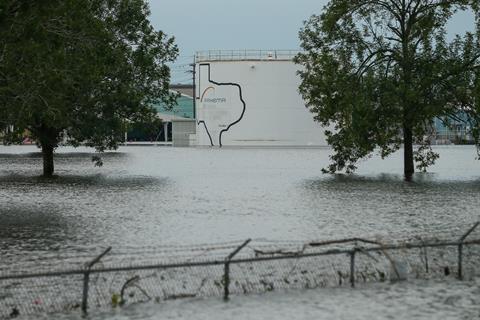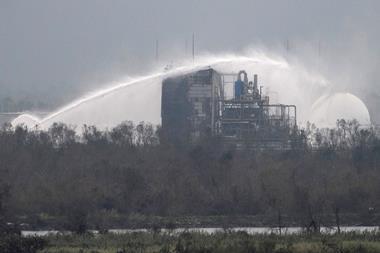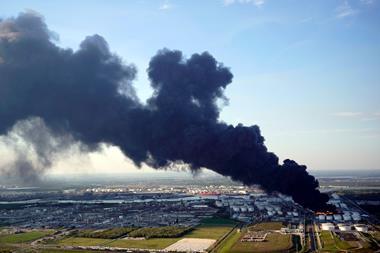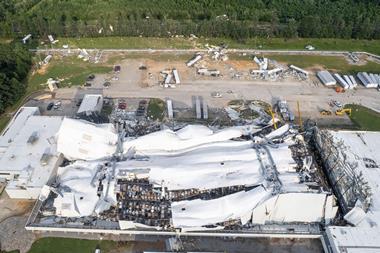The US Environmental Protection Agency (EPA) has issued final amendments to its risk management program (RMP) that aim to better safeguard communities from accidents at chemical facilities. However, industry bodies have responded with heavy criticism, arguing that the rules could actually undermine security at chemical plants.
The EPA’s new rules apply to nearly 12,000 chemical facilities that operate under the RMP. They require the most hazardous plants to evaluate and implement safer technologies and other accident prevention measures, and also mandate that operators account for the possibility of extreme weather events – including hurricanes, flooding and any associated loss of power – in their emergency plans.
Two years ago, the US Congress’ Government Accountability Office warned that almost a third of chemical facilities storing hazardous substances in the US are located in areas with ‘natural hazards’ that may be exacerbated by climate change.
The EPA’s updated RMP also mandates third-party compliance audits and root cause analysis investigations for chemical facilities where accidents have previously occurred. There will also be tighter rules for those facilities that appear to be more accident-prone and pose the greatest risk to communities. These facilities will also be required to ensure that chemical release information is shared in a timely manner with local responders and must provide their chemical hazard information to communities within a six-mile radius of the plant.
According to the EPA’s estimates, leaks from RMP facilities cause more than $540 million (£425 million) in damages each year. The agency calculates that 131 million people live within three miles of RMP facilities.
Potential security threat
In a statement released in response to the EPA’s amendments, the Alliance for Chemical Distribution’s president Eric Byer warned of the final rules’ ‘potential to serve as a roadmap for terrorists aiming to weaponise chemical facilities’.
‘Under this rule, regulated facilities will have to disclose sensitive information to any individual residing, working, or spending significant time within a six-mile radius,’ Byer said. ‘The lack of a “need to know” or vetting requirement for information requests will heighten the risk of sensitive chemical information falling into the wrong hands.’
Byer added that this possibility is particularly alarming given the expiration of the Chemical Facility Anti-Terrorism Standards programme in July 2023, which has already increased vulnerability of chemical operations to terrorist attacks. He also argued that the rules will place additional financial strain on ACD members that are already compliant, particularly at a time when many are financially strained.

The American Chemistry Council (ACC), a trade body that represents chemical companies, also expressed reservations about the updated RMP rules. ‘We are very concerned EPA has decided to abandon a collaborative and data-driven process which has helped decrease chemical related incidents by nearly 80% since RMP was adopted,’ stated Kimberly Wise White, the ACC’s vice president of regulatory and scientific affairs. ‘Instead, the agency has decided to remove important regulatory safeguards and impose unworkable mandates that could jeopardise the safety of facilities that provide vital contributions to critical sectors, including food production, water purification and energy production.’
Although the ACC does support certain aspects of the final rule, including its approach to root cause analysis of process safety incidents, the organisation is concerned that it requires companies to share detailed information about specific chemical hazards at their facilities, removing safeguards put in place after the September 11, 2001 terrorist attacks.
‘This requirement could pose a national security threat by creating opportunities for bad actors to use sensitive information to target a facility or disrupt responses to emergencies,’ the ACC warned. The organisation also cautioned that the new rules could hinder supply chains by pressuring manufacturing facilities to abandon processes involved in the production of chemicals used in the manufacture of semiconductors, clean energy systems and electric vehicles.
However, environmental groups applauded the updated RMP regulation. ‘While there is certainly more that must be done to prevent chemical disasters, EPA’s rule is a major step forward for ensuring that the most hazardous facilities implement safer technologies and provide greater public access to information,’ stated Kathleen Riley, an attorney with Earthjustice. ‘We urge industry to implement these life-saving measures without delay,’ she said.

















No comments yet